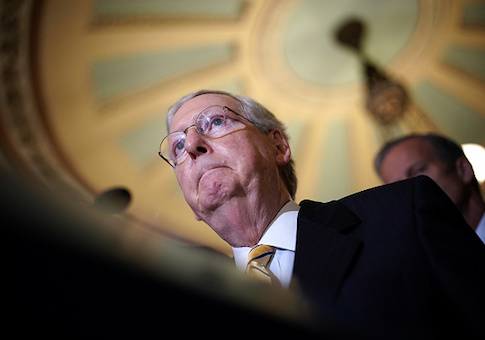Senate Majority Leader Mitch McConnell (R., Ky.) has taken recent steps in Congress to stop Democrats' efforts to delay or block President Donald Trump's federal judicial nominees.
McConnell has elevated confirming appeals and district court judges to a top priority in the Senate, the Weekly Standard reported Wednesday.
"I decide the priority," McConnell said in an interview with the Weekly Standard. "Priority between an assistant secretary of state and a conservative court judge—it's not a hard choice to make."
"Regardless of what tactics are used by Democrats, the judges are going to be confirmed," McConnell added.
McConnell has taken heat from some conservatives for moving slowly to implement Trump's agenda, including efforts to get more court nominees confirmed.
The Conservative Action Project, for example, released a memo calling on McConnell to "schedule committee and floor action every Thursday and Friday for the foreseeable future" to confirm judges and administration officials.
Another group that promotes the nomination of more conservatives, the Judicial Crisis Network, planned to run an ad urging McConnell to accelerate the pace of judicial nominations, but held off after talking to the senator's aides, Politico reported.
Amid this pressure, McConnell has moved to speed up the confirmation process for judicial nominees. He ended the "blue slip" tradition, which allowed a senator to deny a nominee a Senate Judiciary Committee hearing by refusing to return their slip to the committee. This is a Senate tradition, but not a rule, under which the White House consulted a state's senators before a president nominated a judge from that state, the Washington Examiner noted.
"The majority," Republicans in this case, "[will treat a blue slip] as simply notification of how you're going to vote, not as an opportunity to blackball," McConnell told the Weekly Standard.
McConnell is taking other steps to speed up the judicial nomination and confirmation processes, such as addressing the "30 hours rule," which allows 30 hours of debate on a nominee. McConnell, who sets the Senate schedule as majority leader, will not overturn the rule but will set aside time for these debates.
Concern among Republicans that they may lost the majority in the Senate after the 2018 elections has added to their sense of urgency to maximize conservative influence on federal courts. McConnell says this concern "is another reason to [act] more quickly."
Since Trump was inaugurated in January, the number of judicial vacancies has grown from 106 to 149, and upcoming resignations will increase that number even further to 166.
